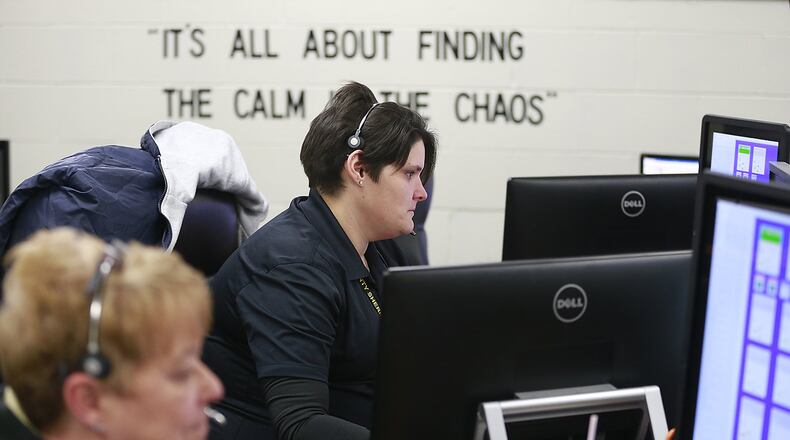Leaders have said operations will improve if all jurisdictions are on the same frequency. It will also allow for 911 calls to come to one location. Currently, 911 calls go to different locations based on where callers are located and what type of phone they’re using, which can lead to delays in response times as calls are transferred.
“It’s a no-brainer if you’re looking at it from a standpoint of saving lives,” Clark County commissioner John Detrick said at his last meeting on Dec. 29
This year, eight of the 10 townships will again contract with the Clark County Sheriff’s Office for dispatching services. Clark County commissioners approved about $127,000 in contracts with four townships last week, including Moorefield ($43,000), Springfield ($42,000), German ($27,000) and Pike ($14,000).
The four other townships — Bethel, Harmony, Madison and Pleasant Twps. — are also expected to contract services, Detrick said. Some townships have saved between $50,000 and $75,000 dollars annually after contracting with the Sheriff’s Office in recent years, Detrick said.
The city and county have held discussions about creating a countywide 9-1-1 dispatch center off and on for about 15 to 20 years. In 2013, after the city purchased the former U.S. Army Reserve military complex at 1515 W. High St., discussions picked back up, but no agreements have been put in place since that time.
The plan initially called for the city, county and townships to create a council of governments, which would give equal voting rights to all entities. Champaign County used a similar process — which gave a voice to all participating local governments — when it created its countywide dispatch in 2006. Montgomery and Miami Counties also have countywide dispatch centers.
Earlier this year, the Auditor of State Dave Yost came to Springfield to discuss Ohio House Bill 5, a new law which allows state agencies or local public entities to petition the Ohio Auditor’s Office to conduct a feasibility study to determine if sharing services could lead to cost savings, such as the combined dispatch center.
It’s unlikely money would be granted to study the dispatch center under the former plan because it creates another layer of government, Clark County commissioner Rick Lohnes said. The best method is to contract the service out to one of the entities, he said.
“The more I thought about it, it’s more government and it’s management by committee, which is inefficient,” he said.
Lohnes offered Springfield a deal where it would essentially contract with the Sheriff’s Office with about $50,000 in cost savings the first five years, followed by a catch-up payment after five years, he said, but it was turned down.
Springfield City Manager Jim Bodenmiller prefers a council of governments method giving equal and mutual control to all entities involved, as opposed to one party being the ultimate authority, he said.
“I personally believe that’s a better system, but we have talked about both options and we remain willing to talk about both options,” Bodenmiller said. “We still believe very strongly in the concept and want to continue those discussions.
Lohnes has since put the discussions on hold because of the city’s financial troubles. Clark County also saw Deb Burchett elected as its new sheriff, who must agree to the plan to combine dispatch throughout the county. Burchett did not return calls seeking comment.
“It’s not dead,” Lohnes said.
A consulting firm report indicated the city and the county would have to spend between $2.9 million and $3.5 million on new equipment and millions more to renovate the facility on High Street. Lohnes doesn’t think it will cost as much as estimated, he said.
“I’m convinced it doesn’t need to be that (expensive),” Lohnes said.
About $1.3 million of the city’s general fund is spent on dispatch services, while the remainder comes from the city’s police levy fund. Both a resident-led group and an independent consultant recommended examining combined dispatching services to save money after completing audits of the city’s budget last year.
“I continue to believe it will be a better service for the public once implemented,” Bodenmiller said.
Bodenmiller and County Administrator Jenny Hutchinson will continue to meet to discuss the project, he said.
“It’s definitely an issue we all agree we need to continue to work on with the goal of implementing it in 2017 if at all possible,” Bodenmiller said. “At the end of the day, there are funding formulas to figure out and service issues we have to lock down.”
Green and Mad River Townships are the only two who have not agreed to a contract with the Sheriff’s Office — which Detrick also hopes the commission will bring into the fold for a combined dispatch center.
Mad River Twp. has no immediate plans to make a change, Trustee Bob McClure said. The township spends about $110,000 annually for dispatching services, which includes four full-time employees and one part-time employee.
The last time it researched making a change, trustees felt the services provided by its own dispatchers outweighed the cost savings, McClure said.
“We felt the numbers were within reason,” McClure said. “We’ve felt we want to continue with those services as long as we’re able to do that. … We’re not saying forever, but if we can justify it, then we want to be able to provide it.”
Green Twp. Trustee Allen Armstrong could not be reached for comment.
By the numbers
$1.4 million: Amount of money Clark County will spend on dispatching next year.
$1.5 million: Amount of money Springfield will spend on dispatching next year.
150,000: Estimated number of calls handled annually by Springfield and Clark County dispatchers.
Committed to coverage
The Springfield News-Sun is committed to covering stories involving taxpayer dollars, including extensive coverage of the city of Springfield’s budget situation.
About the Author

